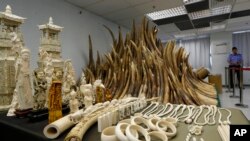Tanzania's government is denying allegations in a new report that officials traveling with China's president last year illegally purchased thousands of kilograms of ivory in the East African nation.
China has also denied the allegations, made this week by a British nongovernmental group, the Environmental Investigation Agency (EIA).
Tanzanian government spokesman Assah Mwambene told VOA's Swahili Service on Friday that the EIA had a sinister motive in releasing the report.
"I believe [EIA] has a secret agenda regarding the relations between Tanzania and China," Mwambene said. "Three-quarters of those involved in this illegal trade are not Chinese as purported in the report."
He also questioned the timing of the report, saying that relations between Tanzania and China were good and noting that the presidents of the two nations had recently visited each other's country.
"Why is this report being released now, when we have just had what we call a reciprocal visit after Chinese president’s last visit to Tanzania and the recent visit by Tanzania’s president to China?" Mwambene said.
In Beijing on Thursday, Chinese Foreign Ministry spokesman Hong Lei said that the charges were "groundless" and that his government strongly objected to the report.
The EIA said Thursday that members of Chinese President Xi Jinping's official party illegally purchased a large quantity of elephant tusks during a visit to Tanzania in March 2013. It said the officials smuggled the ivory out of the East African nation aboard the presidential airliner.
The environmental group's account quoted ivory smugglers in Dar es Salaam who said the volume of Chinese purchases doubled the price of ivory on the local black market.
China is the world's largest market for smuggled ivory. The material is seen as a status symbol and used both for decorative objects and in traditional Chinese medicine.
Environmental activists say the demand for illegal ivory from Asia has encouraged widespread poaching in Africa, devastating Tanzania's elephant population.
International ivory sales were banned in the 1980s in an effort to protect elephants. Tens of thousands of elephants are killed by poachers each year for their tusks.







